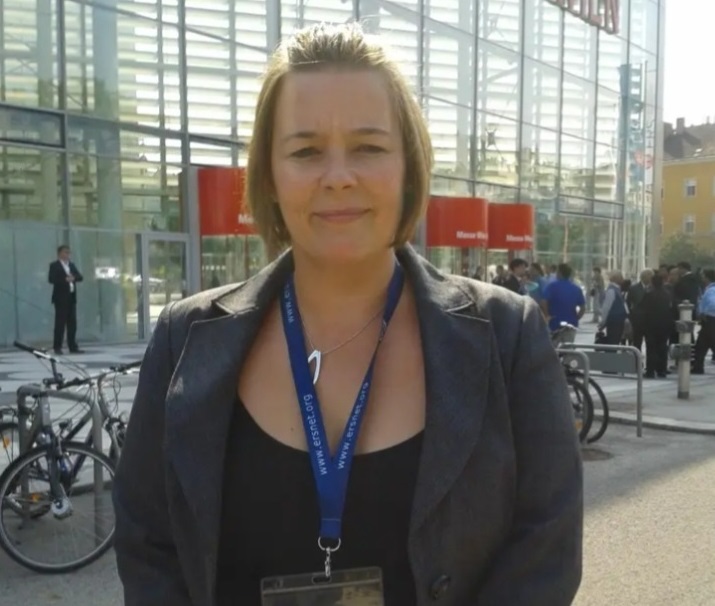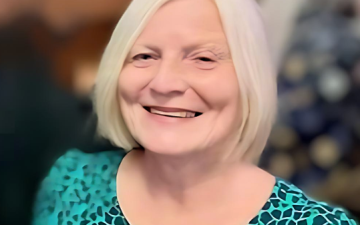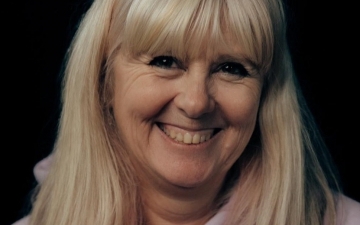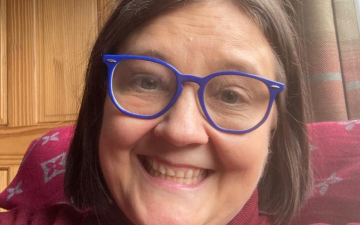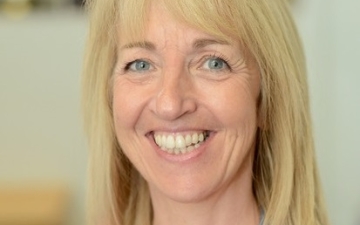
Here, she tells us why she became a nurse, how special it was to become the UK’s first Severe Asthma Nurse Consultant and why nurse-led research is so valuable.
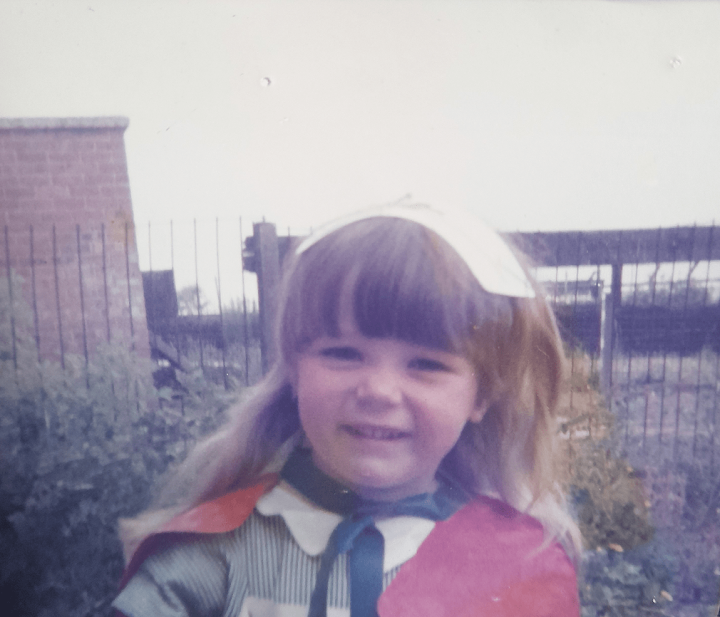
Believe it or not, Leanne’s nursing career started out of her love for watching Casualty. “It sounds so funny when I think about it now, but I loved watching Casualty. It looked like such a good thing to do,” Leanne tells us. While she was very much brought up on the thought of going to university to study a subject like Law, it was a summer spent working in a solicitors where she realised she hated the idea of being stuck behind a desk. “I thought, I’m not going to be behind a desk pushing around paper, I want to be able to work among people and make a difference.”
Picture: Leanne, aged 4 pretending to be a nurse.
Leanne started studying nursing in Manchester in 1995, qualifying in 1998. Later working at Manchester University NHS Foundation Trust (MFT), she has built up a lot of experience across many different specialities.
“I applied to do children’s nursing initially and didn’t get accepted. So then I applied to do adult and was accepted. I’ve basically never looked back, I’m a great believer that things happen for a reason.”
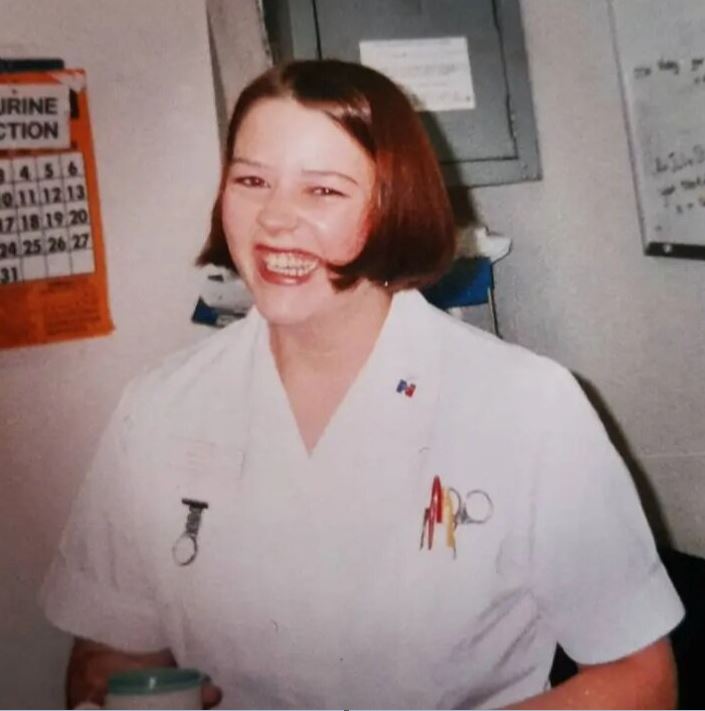
It was a placement experience as a student nurse where Leanne was first exposed to the respiratory speciality. “As part of one of my student placements, I worked on the Pulmonary Oncology Unit, providing palliative chemotherapy and end of life care. I gained great job satisfaction from knowing you could really make a difference. It was really about focusing on quality of life and making every minute count,” she explains.
Following her student placement, Leanne spent her first year as a qualified nurse working in the Pulmonary Oncology Unit at Wythenshawe Hospital. “As my first trained nurse post, I really enjoyed the area. It was very much holistic-based multidisciplinary team-led care, with the patient at the absolute centre. But I always thought I needed more acute care experience, so I moved from palliative care into accident and emergency. Whilst I enjoyed A&E, I realised it wasn’t the area of nursing for me, as I liked to see the patient through their complete journey of care.”
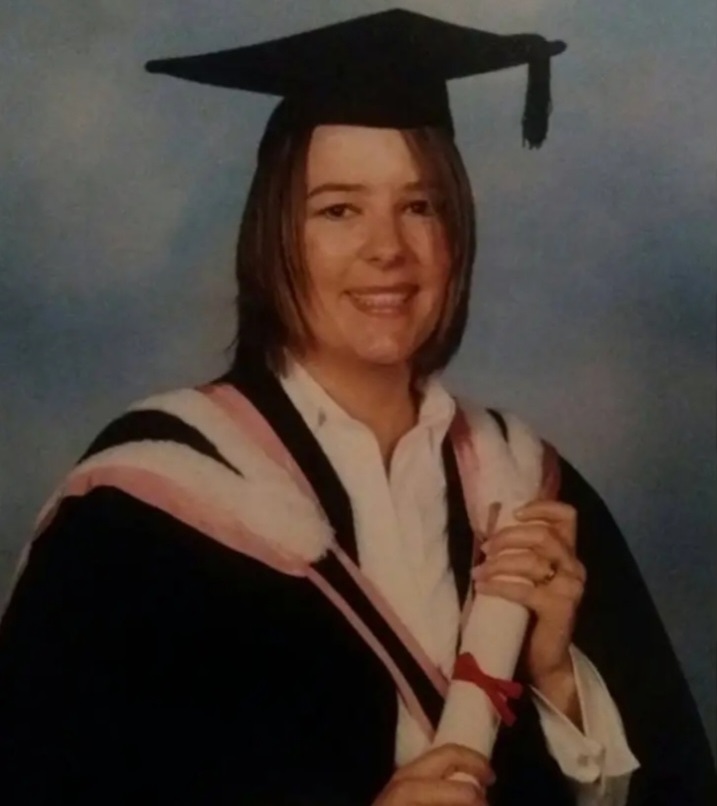
Taking a complete jump from a caring, nurturing environment to very fast-paced critical care work, Leanne decided the fast-paced environment wasn’t for her. She inadvertently ended up back in respiratory, working in thoracic surgery. This is where she was encouraged to complete extra studying.
“I had an amazing manager who really supported me. She believed in me and really pushed me. She encouraged me to do the top-up year to get my BSc Nursing degree as I’d only done the Nursing diploma when I qualified. I obtained my degree at the same time I had my son – I spent my maternity leave writing my dissertation!”
Leanne tells us going back to work and doing shifts wasn’t easy with a baby. “I was asked to apply for what then was a night practitioner role, though it was a senior nurse role, where you oversaw any issues that arose over the evening. At the time I covered all specialities that fell within the heart and lung unit. You learned so much about so many different areas. Because it was heart and lung, it was very much respiratory focused. And that’s what developed my interest in asthma.”
Leanne’s interest in asthma pushed her to apply for an Asthma Nurse Specialist post in 2005. “As much as I loved the practitioner role, working nights was physically very demanding. You also didn’t get the chance to focus particularly on one specific area,” Leanne says. She knew she wanted to specialise, to provide the best care possible for patients affected physically and psychologically by severe asthma. “I always knew from day one I never wanted to be a Nurse Manager, I always wanted to specialise in a specific area. I applied for the post and didn’t think in a million years I’d get it; I was really proud to be offered the job because there was significant competition.”
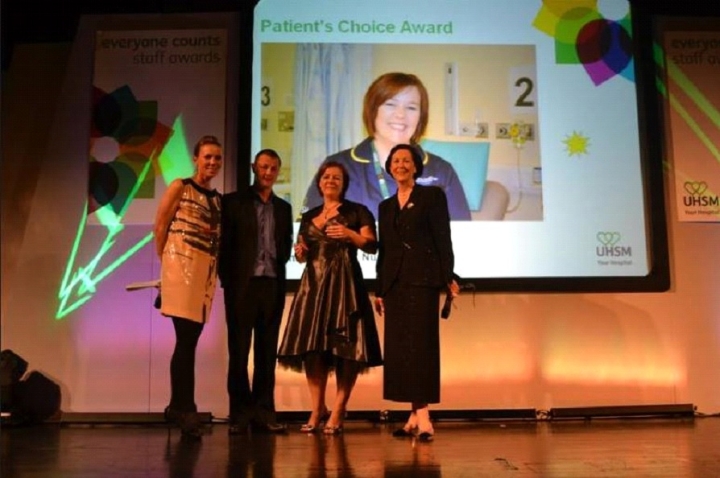
Leanne has been nominated for and won several awards alongside her team, which are some of her proudest moments. In 2009, she achieved the Trust’s Patient Choice Award, an accolade awarded to a member of staff or team nominated by the public for providing extraordinary patient care. “It meant a lot because I knew it had come from the patients, and to me that meant the world,” Leanne tells us.
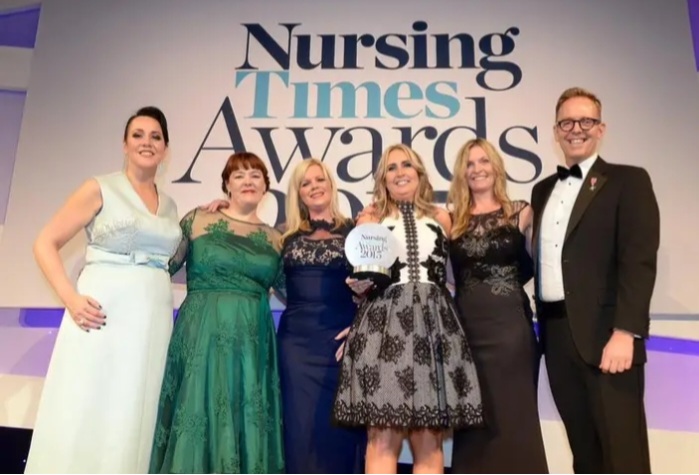
Leanne and her team took home a win from Nursing Times for the setup of an asthma patient support group. “We set up an informal meeting where it would be an opportunity to do very simple education sessions, covering the basics of asthma physiology and ranging to medications, emotional support, benefits and advice. It allowed patients who were often feeling isolated the opportunity to speak to and support each other. We presented it to the Nursing Times as part of our shortlisting interview and I think it was our passion for improving patient care and supporting patients to improve their quality of life that helped us secure the award.”
Passionate about nurse-led research, Leanne tells us she was in a fortunate position to study a Masters in Research while working, graduating in 2016. “It was through the National Institute for Health and Care Research, known as NIHR. I was able to work and study during the Master’s degree which is where I completed my phenomenological study looking at the impact of asthma on intimacy in relationships,” Leanne explains. It was the first empirical study exploring the impact of severe asthma upon intimacy and relationships. It has provided a valuable insight into an important yet rarely discussed topic in asthma, identifying that living with severe asthma can impose a significant emotional burden alongside physical limitations.
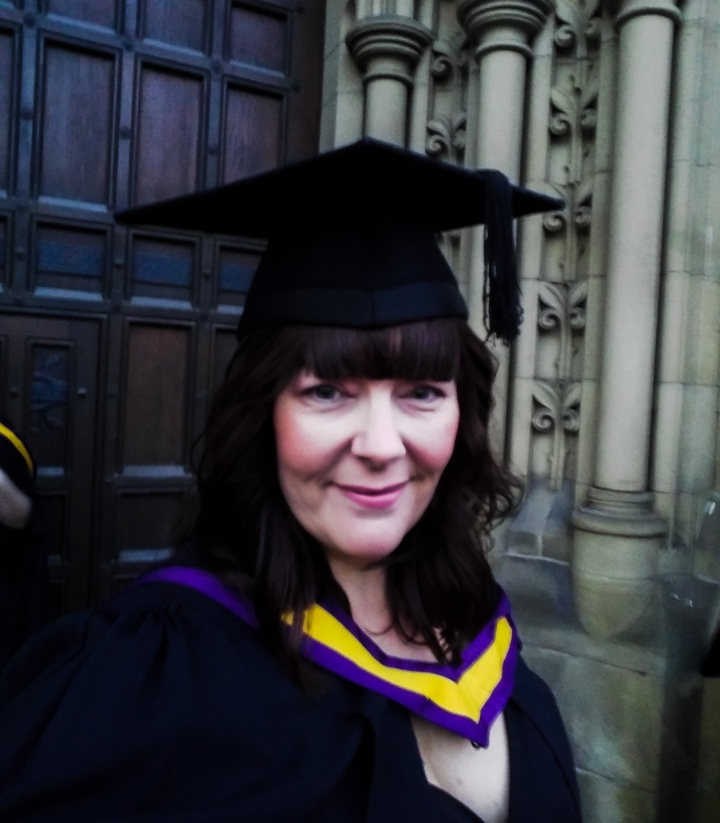
Leanne tells us her role working directly with patients and in research is an honour, and shows how nurse-led research can make a significant difference to patient care. Her Master’s degree taught her a lot about the importance of research. “I competed the course, having learnt so much, but for me undertaking my own research, to be able to share the experience and get the patient perspective out there was an absolute honour. I firmly believe that nursing research fits hand in hand with medical research. Until you understand the concept of what it’s like to live with the disease, we’re never going to understand the disease completely. Through research, we can articulate the patient voice and patient experience.”
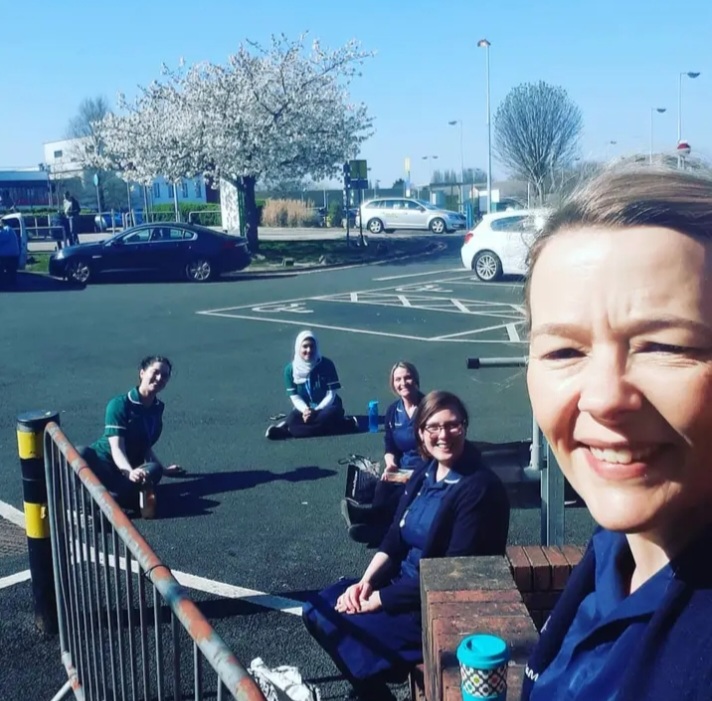
The pandemic was tough for many healthcare professionals but like most, Leanne and her team had to adapt. “We went from being a massive multidisciplinary team (MDT) to myself and two senior nurses. We had to keep the nurse-led clinics going to continue biologics to keep patients well, supported and out of hospital where we could. We had to instigate home care quite rapidly, which was probably one of the best consequences of COVID-19. That’s something we’d tried to get going for a long time and home care has continued to grow from strength to strength, making a significant improvement in the quality-of-care delivery and allowing the patient treatment at home. It was a challenge, but we are a very close-knit team, and we continue to keep in contact and support each other, even when some of the team were working in other areas during the pandemic.”
In 2021, Leanne applied for and secured the Severe Asthma Nurse Consultant post. “I was very lucky to be recruited into that post which is the first Severe Asthma Nurse Consultant post in the UK. It is an absolute pleasure and saw me achieving my lifelong career goal – and fly the flag for nursing research.” As part of her role, Leanne has 50% allocated time for research and 50% for clinical work. She works autonomously in a clinical capacity and is also undertaking a PhD, exploring the outcomes, experiences and support needs of young adults with severe asthma.
“Part of my research role is about raising the profile and highlighting the research agenda within nursing and Allied Health Professionals. Research can be unknown and intimidating for a lot of people, but it’s showing how valuable nursing and Allied Health Professionals’ contributions to delivering their own research can be to patient care. Nurses are unique, and we’re very fortunate to have that position where we see patients day in and day out. We really get to know them and approach a research investigation, and see patient problems, in a different way to other disciplines.”
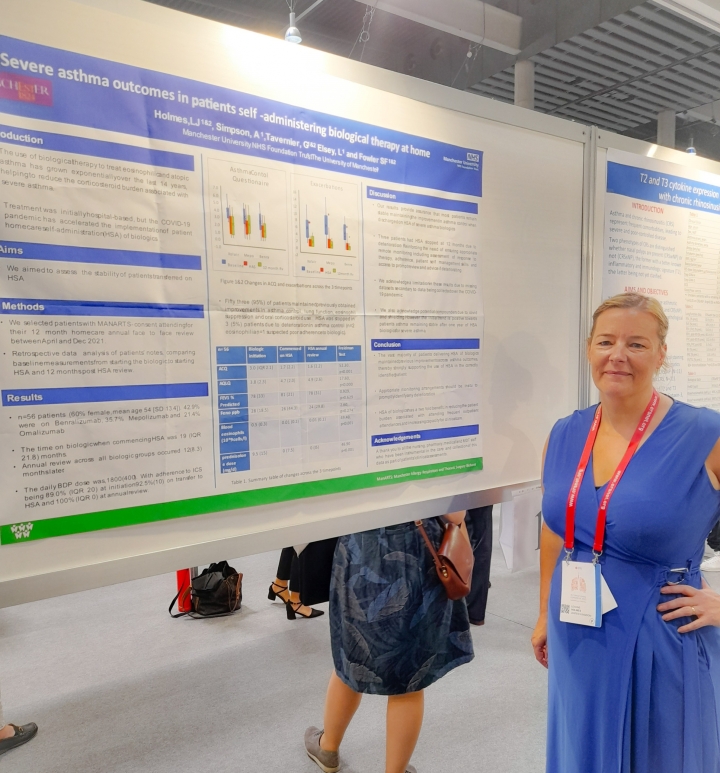
Leanne tells us she’s been in her dream job for 18 months now. Ask what she’d be doing if she hadn’t gone into nursing, and she’ll tell you there wouldn’t be anything else. “I couldn’t imagine doing anything any differently. If money wasn’t an object, I think I’d be living on a little farm somewhere, to compliment my nursing. In my career, there have been a few challenges, but I think every experience, whether good or bad, shapes you, defines you and ultimately makes you a better nurse.”
Words of wisdom
If Leanne had one piece of advice for anyone starting out in respiratory nursing, it’s to listen to your gut feelings. “Surround yourself with like-minded people and take as much support as is offered. Also, never keep knowledge to yourself. I’ve learned so much from other people and hope that I, in turn, have shared and passed my knowledge on. It’s so important that we nurture and empower each other, not just within the nursing field, but within the wider multidisciplinary team. Lastly, as nurses we need to stand up, recognise and be proud of who we are and what we do – we are the backbone of the NHS and make such a positive difference, whatever our role.”

